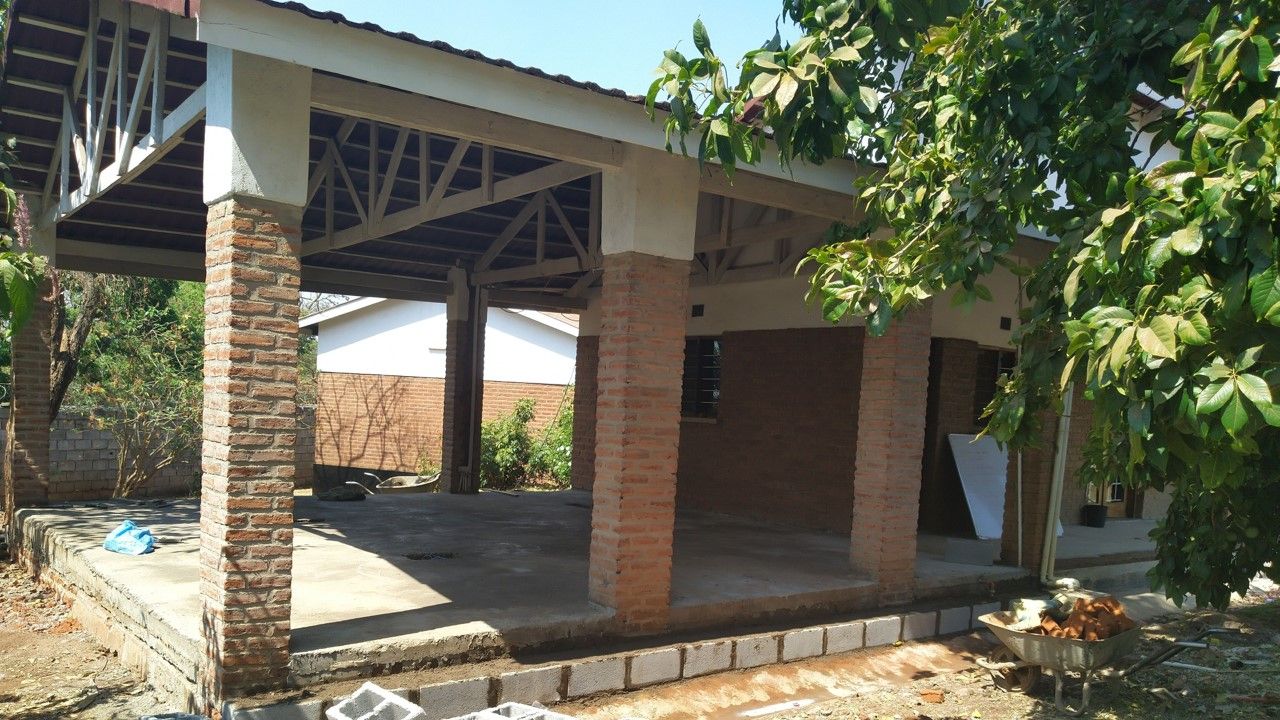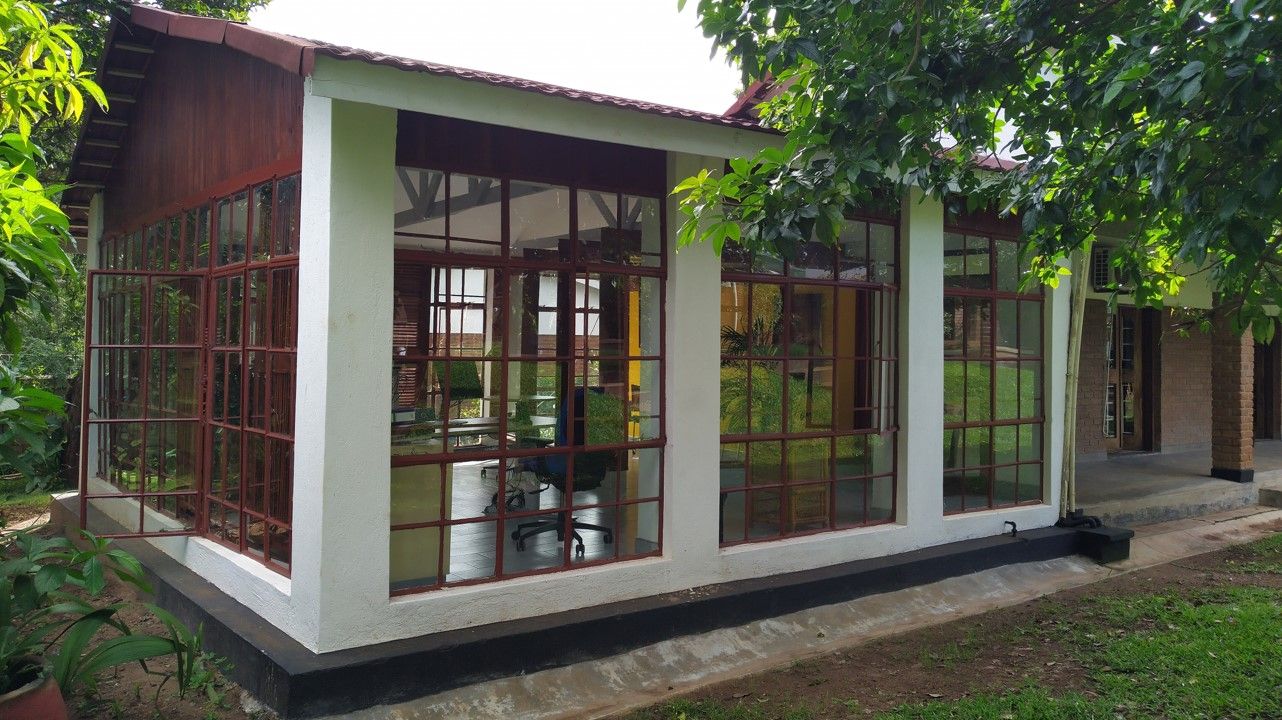We build in line with sustainability standards and conserve biodiversity
Biodiversity: wildflower meadows instead of lawns
Protecting and promoting biodiversity is a core objective in many projects with partner countries. But GIZ also does its bit for species protection at its own locations inside and outside Germany. Enhancing biodiversity worldwide and raising awareness and sharing knowledge among staff is one of the goals set out in GIZ’s Sustainability Programme. We have undertaken to develop and implement biodiversity strategies at our own properties in Germany and abroad by 2025. We intend to explore similar options for the premises we lease.
The criteria set out in GIZ’s invitations to tender also offer leverage for sustainability, ensuring that products such as office materials, printed materials, electricity and cleaning supplies are environmentally sound. Purchasing timber products is a particularly critical matter. The staff of the Procurement and Contracting Division ensure compliance with international biodiversity standards. Sustainability is also prioritised in the canteen. For instance, our chefs also use fruit and vegetables that would normally be rejected because they do not meet the optical standards of the trade. And traditional locally grown fruit and vegetable varieties are used. Because yields are lower, they are rarely grown commercially, but they are vitally important for preserving biodiversity.
GIZ’s properties themselves provide an opportunity for promoting biodiversity. Although our buildings in Germany are mainly located at relatively small sites in inner-city areas with little scope for encouraging biodiversity, the aim is to grass the roofs and include as many local insect-friendly plant species as possible in the outdoor areas. GIZ also wants to ensure that as little of the area as possible is sealed.
Progress can already be seen in Eschborn, for instance, where cornflowers, yellow sweet clover and cow parsley attract beneficial insects. Some 700 square metres of lawn have been turned into a wildflower meadow. GIZ is not only offering food, but also a home for bees and bumblebees. Insect hotels entice these winged visitors to nest – with tangible success: rare solitary bees, whose habitats are highly endangered, have already settled there. These wild bees pollinate many wild plants and therefore preserve natural diversity. A second example is in Bonn-Röttgen. The four buildings on the Kottenforst Campus, home to the Academy for International Cooperation (AIZ), border on Kottenforst Forest, which is part of the Rhineland Nature Park. Much of it is a protected area (fauna and flora habitat). Particular attention is therefore paid to biodiversity at this location. We are helping preserve traditional varieties of fruit trees indigenous to the area, for instance, as well as providing nesting places for birds, bats and insects, and cultivating wildflower meadows.
Over the last few years, GIZ has invested a great deal in the maintenance of its existing buildings and the construction of new ones. We rely on sustainable design for both renovation work and new construction projects. In recent years, therefore, all of our new buildings at GIZ have been planned, completed and certified according to the rigorous German Sustainable Building Council (DGNB) Gold Standard.
New campus in Bonn obtains Gold Standard certification
GIZ is also investing in modern workplaces. Following the completion of a new six-storey building at the end of 2019, the Bonn Campus now has workplaces for 1,500 people – 500 of them in the neighbouring Meander Building that has been open since 2015. Like the Meander Building, the new property has obtained Gold Standard certification from the German Sustainable Building Council. The campus has been recognised for its energy efficiency, resource conservation and healthy working environment. In line with GIZ’s new worlds of work strategy, it offers team-working spaces, modern conference and video conference rooms, and quiet areas for concentrated work.
Approximately EUR 165 million has been invested in this construction project. Run entirely on green energy, it has been fitted with a photovoltaic system, including battery storage, that primarily powers the charging stations and charging cabinets for e-mobility. Any surplus electricity will be fed into the national grid in return for a fee. A system of heat pumps with climate-neutral CO2 as a coolant uses energy from the groundwater to meet around 80 per cent of heating and cooling needs. LEDs are used as the primary source of lighting. Numerous charging stations for electric cars and e-bikes in the underground car park facilitate e-mobility among our employees. A large number of covered bike racks and biodiverse outdoor spaces with over 150 indigenous plant species, as well as a green roof, complete the sustainable building design.
Eschborn Campus
We are striving to concentrate buildings at our Eschborn site, to develop an Eschborn Campus. The next few years will see a new property completed, which will form an ensemble for the future with the existing buildings. By 2025, we plan to build a six-storey office building on the 15,000-square-metre site that will house about 900 workplaces. The plans for the new building have been drawn up by the Vienna-based architecture office Caramel. Phoenix Real Estate Development GmbH will be the project developer. Rented space in three buildings will then no longer be needed, and one building that belongs to GIZ will be sold.
The purchase contract for the new building was signed in December 2020. The new property aims to comply with the German Sustainable Building Council’s most rigorous Platinum Standard. Sustainable construction means dealing responsibly with existing resources, minimising energy consumption and conserving the environment. In practice, this means building as little as necessary, and always in line with life cycles, and using renewable materials as far as possible. The façade of the new building will be primarily timber, while recycled concrete will be used for the carcass. There will also be a photovoltaic system on the roof and a geothermal energy plant extracting heat from underground.
The 3,500 m² courtyards and grounds will be designed to be near-natural. Indigenous trees, shrubs and grasses will be planted, providing a high ecological value and preserving biodiversity. As little of the area as possible will be sealed. This should create a habitat for indigenous species and encourage people to live in harmony with nature.
Sustainability at our properties abroad
Sustainable construction is not an explicit field of action in the Corporate Sustainability Handprint® (CSH). Most of GIZ’s buildings outside Germany are leased, which limits our scope for influencing their design. Many staff also work in offices of partner organisations. Nonetheless, the country directors and project managers in our partner countries also factor sustainability into their construction and leasing activities wherever possible. In Malawi, for instance, the country office was renovated in August 2020 and insulated to a high standard. It also offers barrier-free access.
Shared engagement for biodiversity
GIZ intends to lead by example. The company has been part of the cross-sectoral Biodiversity in Good Company initiative since its inception in 2011. Companies from numerous industries have joined the initiative to work together to protect biodiversity and use it sustainably worldwide. In this way, GIZ supports the international Convention on Biological Diversity.
Information on the following sustainability standards can be found on this page:
GRI standard 304


